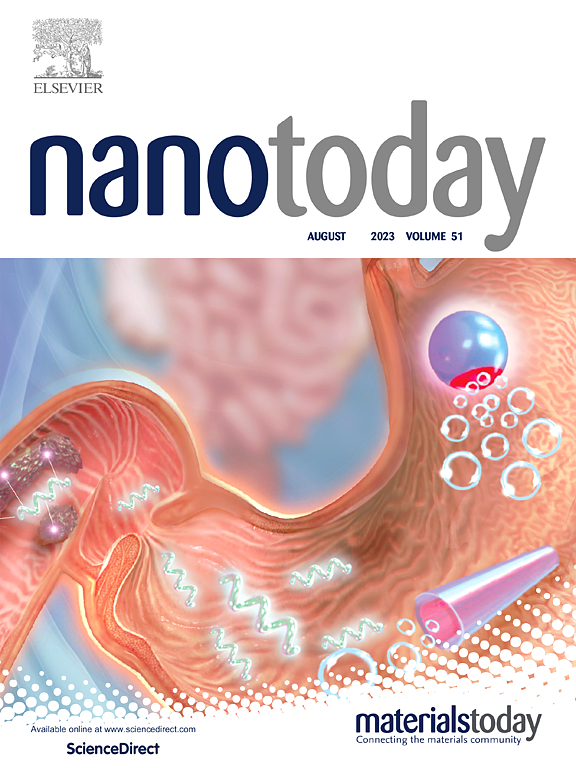选择性抗菌脂质口服丁酸梭菌对核梭菌相关肠道疾病的强化治疗
IF 10.9
1区 材料科学
Q1 CHEMISTRY, MULTIDISCIPLINARY
引用次数: 0
摘要
肠道菌群在宿主免疫调节和维持体内平衡中起着至关重要的作用。某些病原体如核梭杆菌(Fn)的异常增加可以打破体内平衡并驱动各种肠道疾病的进展。补充益生菌可以在不干扰菌群的情况下部分抵消这些影响。然而,广谱抗菌治疗在治疗系统中与益生菌治疗不相容,因为它们对益生菌和整个肠道微生物群都有非选择性损伤。在此,我们从12种化学性质不同的脂质组合文库中筛选并鉴定了月桂酸(LA)衍生的脂质S12,因为它对益生菌丁酸梭菌(Cb)的Fn具有选择性抗菌活性。然后利用这种脂质作为单细胞载体口服递送Cb (Cb@S12),以增强对fn相关肠道疾病的治疗。S12的表面武装可以有效地保护Cb免受模拟胃液和肠液的侵害,从而显著延长其在小鼠体内的肠道滞留时间。口服Cb@S12通过选择性地消除Fn,同时保留Cb的益生菌活性,对Fn加重的炎症性肠病和原位结直肠癌显示出令人印象深刻的治疗效果。本研究介绍了一种使用选择性抗菌脂质进行益生菌包封的稳健方法,为肠道疾病提供了一种无抗生素的“益生菌-拮抗”联合治疗策略。本文章由计算机程序翻译,如有差异,请以英文原文为准。
Oral delivery of Clostridium butyricum using selective antibacterial lipids for enhanced treatment of Fusobacterium nucleatum-associated intestinal diseases
The gut microbiota plays a crucial role in host immune modulation and maintaining homeostasis. An abnormal increase in certain pathogens such as Fusobacterium nucleatum (Fn) can break homeostasis and drive the progression of various intestinal diseases. Supplementing probiotics can partially counteract these effects without flora disturbance. However, broad-spectrum antibacterial treatments are not compatible with probiotic therapy in a therapeutic system due to their non-selective damage on both probiotics and the overall gut microbiota. Herein, we screen and identify lauric acid (LA)-derived lipid, S12, from a combinatorial library of 12 chemically diverse lipids for its selective antibacterial activity against Fn over probiotic Clostridium butyricum (Cb). This lipid is then utilized as a single-cell carrier to orally deliver Cb (Cb@S12) for enhanced treatment of Fn-associated intestinal diseases. The surface arming of S12 effectively protects Cb from simulated gastric and intestinal fluids, thus significantly prolonging its intestinal retention in mice. Oral administration of Cb@S12 has demonstrated impressive therapeutic outcomes against Fn-aggravated inflammatory bowel disease and orthotopic colorectal cancer by selectively eliminating Fn while preserving the probiotic activity of Cb. This study introduces a robust approach using selectively antibacterial lipids for probiotic encapsulation, offering an antibiotic-free “probiotic-antagonistic” combination therapeutic strategy for intestinal diseases.
求助全文
通过发布文献求助,成功后即可免费获取论文全文。
去求助
来源期刊

Nano Today
工程技术-材料科学:综合
CiteScore
21.50
自引率
3.40%
发文量
305
审稿时长
40 days
期刊介绍:
Nano Today is a journal dedicated to publishing influential and innovative work in the field of nanoscience and technology. It covers a wide range of subject areas including biomaterials, materials chemistry, materials science, chemistry, bioengineering, biochemistry, genetics and molecular biology, engineering, and nanotechnology. The journal considers articles that inform readers about the latest research, breakthroughs, and topical issues in these fields. It provides comprehensive coverage through a mixture of peer-reviewed articles, research news, and information on key developments. Nano Today is abstracted and indexed in Science Citation Index, Ei Compendex, Embase, Scopus, and INSPEC.
 求助内容:
求助内容: 应助结果提醒方式:
应助结果提醒方式:


